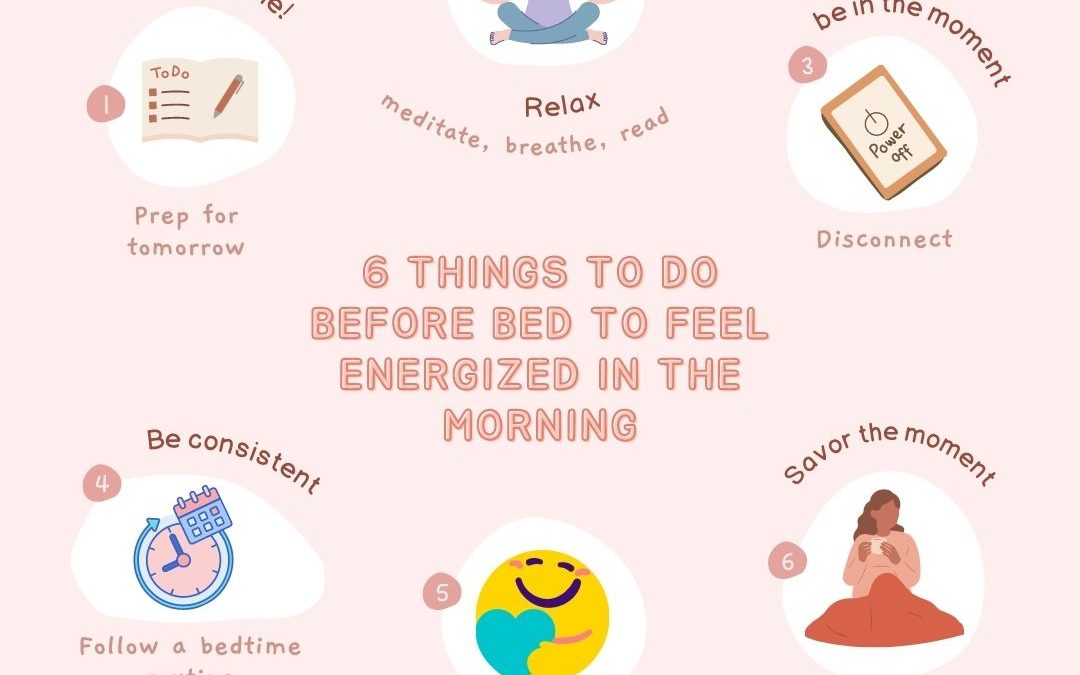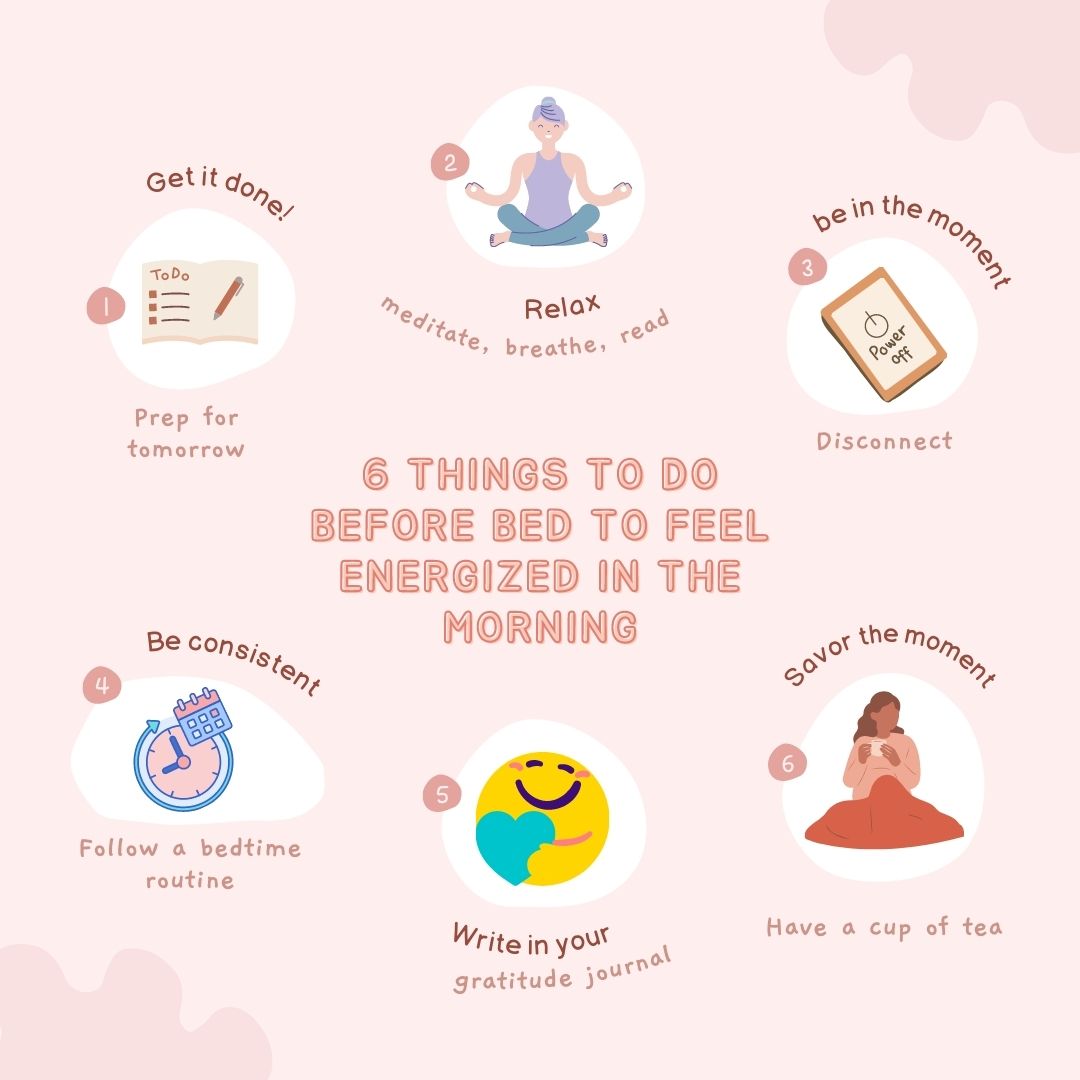Do you wake up in the morning feeling like you need a nap? We’ve all been there, but if this sounds like your daily morning routine, it may be time for a change. What you do before bed may be sabotaging your sleep and your mornings. So, what are some good things to do before bed every night? What can you do at night to feel more energized in the morning? Here are some helpful tips.
6 Positive Things to do Before Bed to Feel Energized in the Morning
1. Prepare for the Next Day
To wake up feeling energized and ready to tackle the day, start prepping for the day the night before. Try to get everything ready for the day before you hit the pillow.
- Lay out your clothes for the next day.
- Set your coffee maker to start brewing before you wake up.
- Make and pack your lunch, so it’s ready to go.
- Put your bags near the door, so you don’t forget anything on your way out in the morning.
- Create a to-do list of things you need to tackle for the day, starting with the most important tasks.
Taking a little time to prepare for tomorrow will save you stress and time in the morning. That alone will help you feel more energized.
2. Find Relaxing Things to do Before Bed
Do you have trouble falling asleep at night? You’re not alone. About 70 million Americans have chronic sleep problems. While the issue is complicated, part of the problem is that people are just too anxious or wired to fall asleep.
Setting aside time to do calming things to do before bed can help you wind down and get into the right state of mind to fall asleep and stay asleep.
Meditate
A nightly meditation practice can help you relax, forget the stresses of the day and quiet your mind. All of that chatter, noise and worry disappear when you learn how to master meditation, and that can help you sleep better at night.
Research has found that mindfulness meditation can help improve sleep quality. Over the long term, these improvements are on par with those seen with sleep medication. There are many benefits of meditation anyway, so you have nothing to lose by giving it a try.
If you’re not sure how to get started, check out the video below for an excellent guided sleep meditation.
Sleep Talk Down Guided Meditation: Fall Asleep Faster with Sleep Music & Spoken Word Hypnosis
Take a Relaxing Hot Bath
It’s hard to beat the calming effects of a warm bath. Play some soothing music, light some candles, add a bath bomb and slip into a state of total relaxation.
Make it part of your nightly ritual to help you unwind and get ready for bed at night.
Do a Little Nighttime Yoga
A little nighttime yoga can melt your stress and tension away, making it easier to sleep at night. The key is to choose a practice that’s slow and easy-going, like the one below.
Bedtime Yoga | 20 Minute Bedtime Yoga Practice | Yoga With Adriene
Practice Deep Breathing Exercises
Deep breaths can help slow your heart rate and calm your nervous system. If you’re feeling stressed or anxious about something, deep breathing exercises give you something to focus on and help bring you back into the present moment.
Try this super easy breathing exercise to help bring you into a relaxed state before bed:
- Breathe in for four seconds.
- Hold your breath for four seconds.
- Breathe out for four seconds.
- Hold your breath for four seconds.
Keep repeating this slow breathing practice until you fall asleep naturally or get into a more relaxed state.
Listen to Soothing Music
Music is a powerful thing. It can pump you up for a workout, it can make you sad, and it can also help you feel more relaxed.
Research has found that music around 60 beats per minute helps the brain synchronize with the beat, and this causes alpha brainwaves. Alpha brainwaves appear when we’re relaxed.
You can find soothing, relaxing music here to help you drift off to sleep at night.
Read a Book
Many people have trouble falling asleep because their brains are too stimulated. Reading may help with that. In fact, reading can help lower cognitive arousal, de-stimulate your brain and even help you stay asleep longer.
Just be careful not to overdo it, and stick to books with lighter storylines. Reading something from the horror genre may just give you nightmares.
3. Disconnect for the Night
I think we can all agree that we spend too much time in front of screens every day. And we’re all guilty of scrolling or binge-watching a Netflix show before bed. But screen use before bed is probably ruining your sleep.
Screens produce blue light, which is the part of the light spectrum that’s most active when we sleep. But when you stimulate this part of your brain, you make it harder for your body to produce melatonin and “shut down” your brain for the night. In other words, it messes with your sleep cycle.
Research has found that two or more hours of screen time at night can seriously hinder the release of melatonin, making it even harder to fall asleep.
Disconnect at least an hour before bedtime. Turn off all devices and screens and do something else – like one of the calming activities above.
It’s hard to resist the temptation to check Instagram one more time before your head hits the pillow, but it’s not doing your sleep or your health any favors. Use your before-bed time to come back to the present moment, relax your mind and prepare for the next day. Make it a daily ritual and consider this time to care for yourself and your mental health.
4. Create a Consistent Bedtime Routine
Creating a healthy bedtime routine can help you fall asleep faster and stay asleep for longer. If you go to bed at the same consistent time every single day and follow the same routine, eventually, that routine will become a signal to your body that it’s time for bed. You’ll naturally feel tired at bedtime.
Your nighttime routine can include:
- Doing your nightly skincare ritual
- Brushing your teeth
- Using an aromatherapy diffuser
- Listening to calming music
- Meditating or deep breathing
Focus on adding calming and relaxing activities to your evening routine to get your body and mind into that relaxed state.
Also, make sure you set a consistent sleep schedule. That means going to bed at the same time every night – even on weekends.
5. Write in a Gratitude Journal
Gratitude is a pretty amazing thing. Research has found that writing in a gratitude journal for just 15 minutes each day can help you worry less at night and enjoy better quality sleep.
The idea is simple:
- Write down things you are grateful for in a journal
- Practice this every single night before bed
The practice helps you stay focused on the positive things in your life and forget your troubles before you lay your head down at night.
Studies have found that people who practice gratitude are generally less depressed and much happier in their lives. Keeping a gratitude journal can help improve your mental health over the long term, which will make you more excited to wake up in the morning and take on the day.
6. Drink Herbal Tea
A hot, soothing cup of herbal tea can help you fall asleep and stay asleep at night. Many herbs naturally help you relax and even induce sleep.
Some of the best herbal teas for bed include:
- Valerian root, which has long been used as a sleep tonic. Valerian root can help reduce stress, headaches, anxiety and heart palpitations. Why is this root so effective at helping you sleep? It has two natural sedatives in it: sesquiterpenes and valepotriates.
- Chamomile. People have been using chamomile to help with relaxation and sleep for centuries. Like valerian root, the flower contains active compounds that have tranquilizing effects, like apigenin.
- Lavender, which is well-known for its relaxing effects.
- Magnolia bark, which has been used in Traditional Chinese Medicine for centuries as a sleep aid. The bark contains a compound called honokiol. This compound binds to GABA receptors to help you feel more relaxed and make it easier to fall asleep.
Try drinking your tea about an hour before bed to give it time to kick in. Use honey instead of sugar or drink it plain to help your body stay in a relaxed state.
Follow the tips above to improve your quality of sleep, make your morning routine less stressful and help you feel more energized. Once you get into the habit of sleeping well and waking up refreshed, you may just find that you can sleep less and better.
Rene is a creative, little gnome. When she's not diving deep into research on health and wellness, she's spending here time out in nature, growing her homestead, photographing wildlife, doing yoga or enjoying a zen (depending on the day) moment with her fur babies. And on top of all of that, she's a professional writer by day, helping businesses around the world grow.


